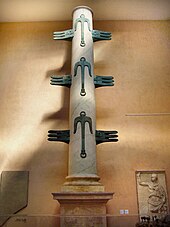Gaius Duilius
Gaius Duilius was a Roman politician and consul in the First Punic War . He came from the plebeian gens Duilia .
Not much is known about his family background or the beginning of his career, especially since he did not belong to one of the traditional families of the Roman aristocracy. Nevertheless he succeeded for the year 260 BC. To be elected consul with Gnaeus Cornelius Scipio Asina during the First Punic War against Carthage . Whether Duilius was given command of the newly built Roman fleet or of the land forces in Sicily has not been clarified because of contradicting sources.
However, the mistakes of Scipio Asina in connection with the battle of the Aeolian Islands and its capture soon made Duilius the sole commander. A little later he met the rest of the Roman fleet on the Carthaginian ships under Hannibal Gisko . The following Battle of Mylae was an overwhelming victory for the Romans, largely due to the use of the " Corvus " grappling bridges. Duilius took possession of a number of enemy ships, including Gisko's flagship. He was the first Roman to be honored with a triumphal procession for a victory at sea . The ramming spurs carried along from the bow of the captured ships were later integrated into an honorary column ( Columna rostrata ) erected in honor of Duilius in the Roman Forum . For the next few centuries this column was located opposite the Curia Iulia on the northern edge of the Via Sacra , only a few meters from the place where the Arch of Septimius Severus was later built; it was rediscovered in 1565.
Duilius was 258 BC BC censor , but seems to have withdrawn from political life in Rome afterwards. It wasn't until 231 BC. BC he took over the office of dictator again to conduct elections.
Several warships of the Italian Navy were named after him in modern times .
literature
- Friedrich Münzer : Duilius 3 . In: Paulys Realencyclopadie der classischen Antiquity Science (RE). Volume V, 2, Stuttgart 1905, Sp. 1777-1781.
- Karl-Ludwig Elvers : Duilius 1. In: The New Pauly (DNP). Volume 3, Metzler, Stuttgart 1997, ISBN 3-476-01473-8 , Sp. 834.
- Eric Kondratieff: The Column and Coinage of C. Duilius: Innovations in Iconography in Large and Small Media in the Middle Republic. In: Scripta Classica Israelica. Volume 23, 2004, pp. 1-39 ( online ).
supporting documents
- ↑ Polybios (Pol. I 21-23) says that Duilius initially commanded the land forces, in the tradition of the history of Cassius Dio by Johannes Zonaras, however, he has been in command of the fleet from the beginning (Zon. VIII 10 and 11).
| personal data | |
|---|---|
| SURNAME | Duilius, Gaius |
| BRIEF DESCRIPTION | Roman politician and consul |
| DATE OF BIRTH | 3rd century BC Chr. |
| DATE OF DEATH | 3rd century BC Chr. |
